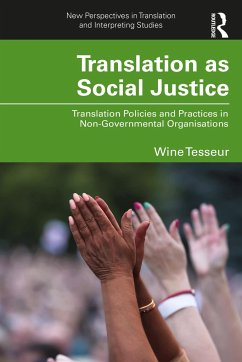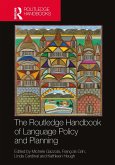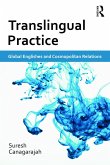Wine Tesseur
Translation as Social Justice
Translation Policies and Practices in Non-Governmental Organisations
Wine Tesseur
Translation as Social Justice
Translation Policies and Practices in Non-Governmental Organisations
- Broschiertes Buch
- Merkliste
- Auf die Merkliste
- Bewerten Bewerten
- Teilen
- Produkt teilen
- Produkterinnerung
- Produkterinnerung
This book analyses the translation policies and practices of international non-governmental organisations (INGOs), engaging in critical questions around the ways in which translation can redress power dynamics between INGOs and the people they work with, and the role of activist researchers in contributing to these debates.
The volume examines the duality of translation and interpreting in INGOs, traditionally undervalued and under-resourced while simultaneously acknowledged as a powerful tool in ensuring these organisations work according to their own values of equal access to information,…mehr
Andere Kunden interessierten sich auch für
![The Routledge Handbook of Language Policy and Planning The Routledge Handbook of Language Policy and Planning]() The Routledge Handbook of Language Policy and Planning242,99 €
The Routledge Handbook of Language Policy and Planning242,99 €![English and Translation in the European Union English and Translation in the European Union]() Alice LealEnglish and Translation in the European Union40,99 €
Alice LealEnglish and Translation in the European Union40,99 €![Exploring World Englishes Exploring World Englishes]() Philip Seargeant (UK The Open University)Exploring World Englishes64,99 €
Philip Seargeant (UK The Open University)Exploring World Englishes64,99 €![The Evolution of EMI Research in European Higher Education The Evolution of EMI Research in European Higher Education]() Alessandra MolinoThe Evolution of EMI Research in European Higher Education42,99 €
Alessandra MolinoThe Evolution of EMI Research in European Higher Education42,99 €![Translingual Practice Translingual Practice]() Suresh CanagarajahTranslingual Practice45,99 €
Suresh CanagarajahTranslingual Practice45,99 €![The Evolution of EMI Research in European Higher Education The Evolution of EMI Research in European Higher Education]() Alessandra MolinoThe Evolution of EMI Research in European Higher Education142,99 €
Alessandra MolinoThe Evolution of EMI Research in European Higher Education142,99 €![The Ambiguity of English as a Lingua Franca The Ambiguity of English as a Lingua Franca]() Stephanie RudwickThe Ambiguity of English as a Lingua Franca42,99 €
Stephanie RudwickThe Ambiguity of English as a Lingua Franca42,99 €-
-
-
This book analyses the translation policies and practices of international non-governmental organisations (INGOs), engaging in critical questions around the ways in which translation can redress power dynamics between INGOs and the people they work with, and the role of activist researchers in contributing to these debates.
The volume examines the duality of translation and interpreting in INGOs, traditionally undervalued and under-resourced while simultaneously acknowledged as a powerful tool in ensuring these organisations work according to their own values of equal access to information, dialogue, and political representation. Drawing on over ten years of ethnographic fieldwork and interview data with a wide variety of INGOs, Tesseur offers unique insights into if and how INGOs plan for translation and interpreting needs while also critically reflecting on her own experience and the ways in which activist researchers like her can ensure social justice efforts are fully reflected in their own working practices. Encouraging a new interdisciplinary research agenda, the volume seeks to raise the profile of language and translation in humanitarian and development contexts and cross-disciplinary dialogue in scholarship on these issues.
The book will be of interest to scholars in translation and interpreting studies, sociolinguistics, development studies, and international relations.
The volume examines the duality of translation and interpreting in INGOs, traditionally undervalued and under-resourced while simultaneously acknowledged as a powerful tool in ensuring these organisations work according to their own values of equal access to information, dialogue, and political representation. Drawing on over ten years of ethnographic fieldwork and interview data with a wide variety of INGOs, Tesseur offers unique insights into if and how INGOs plan for translation and interpreting needs while also critically reflecting on her own experience and the ways in which activist researchers like her can ensure social justice efforts are fully reflected in their own working practices. Encouraging a new interdisciplinary research agenda, the volume seeks to raise the profile of language and translation in humanitarian and development contexts and cross-disciplinary dialogue in scholarship on these issues.
The book will be of interest to scholars in translation and interpreting studies, sociolinguistics, development studies, and international relations.
Produktdetails
- Produktdetails
- New Perspectives in Translation and Interpreting Studies
- Verlag: Routledge / Taylor & Francis
- Seitenzahl: 198
- Erscheinungstermin: 30. September 2022
- Englisch
- Abmessung: 229mm x 152mm x 11mm
- Gewicht: 295g
- ISBN-13: 9781032331317
- ISBN-10: 1032331313
- Artikelnr.: 64104510
- Herstellerkennzeichnung
- Libri GmbH
- Europaallee 1
- 36244 Bad Hersfeld
- gpsr@libri.de
- New Perspectives in Translation and Interpreting Studies
- Verlag: Routledge / Taylor & Francis
- Seitenzahl: 198
- Erscheinungstermin: 30. September 2022
- Englisch
- Abmessung: 229mm x 152mm x 11mm
- Gewicht: 295g
- ISBN-13: 9781032331317
- ISBN-10: 1032331313
- Artikelnr.: 64104510
- Herstellerkennzeichnung
- Libri GmbH
- Europaallee 1
- 36244 Bad Hersfeld
- gpsr@libri.de
Wine Tesseur is Coordinator of External & Internal Communications at the Belgian NGO Trias and also freelances as an NGO consultant. She has published extensively in international journals and guest-edited special issues for Translation Spaces (2018) and the Journal of War & Culture Studies (2019). She is the co-author of Development NGOs and Languages: Listening, Power and Inclusion (2020).
Table of Contents
Chapter 1: Introduction
Chapter 2: Translation management in INGOs throughout history
Chapter 3: Translating One Global Amnesty: Managing Amnesty's message and voice in translation
Chapter 4: Managing volunteer translation: On quality, risk, and ethics in Amnesty's Urgent Action translations
Chapter 5: Language and translation ideologies in international NGOs: Explaining the paradox between English as a lingua franca and social justice values
Chapter 6: Informal translation practices as empowerment? Balancing the need for access and dialogue with risk reduction
Chapter 7: Towards a more comprehensive approach to translating for social justice in international NGOs
Chapter 8: Influencing translation policies as an activist researcher: Evaluating research impact and learning from linguistic choices
Chapter 1: Introduction
- Introduction
- INGOs, language, and T&I
- Conceptual framework
- Engaged research and critical reflexivity
- A note on international development terminology
- Underpinning research
- Structure of the book
- References
Chapter 2: Translation management in INGOs throughout history
- Introduction
- Save the Children UK: a history of language silence?
- Organisational growth and restructuring as an incentive for translation management
- Translation management choices and challenges: limitations of policies and internal services
- Translation as a resource, as risk management, or as inclusion?
- Concluding remarks
- References
Chapter 3: Translating One Global Amnesty: Managing Amnesty's message and voice in translation
- Introduction
- Becoming One Global Amnesty
- Amnesty press releases
- Diverging views on the role of translation in a changing Amnesty
- Discussion and concluding remarks
- References
Chapter 4: Managing volunteer translation: On quality, risk, and ethics in Amnesty's Urgent Action translations
- Introduction
- Amnesty's global Urgent Action network
- Managing volunteer translation: Amnesty Flanders (AIVL) network of Urgent Action translators
- Translation output
- Volunteer translation, risk, and social justice
- Improving practice
- Discussion and concluding remarks
- References
Chapter 5: Language and translation ideologies in international NGOs: Explaining the paradox between English as a lingua franca and social justice values
- Introduction
- Language and translation ideology
- Interview data
- Narrative 2: Encourage mutual language learning and translation
- Narrative 1: English as a lingua franca as the best possible solution
- Concluding remarks
- References
Chapter 6: Informal translation practices as empowerment? Balancing the need for access and dialogue with risk reduction
- Introduction
- Case study 1: Multilingual staff as informal translators and interpreters
- Case study 2: Free machine translation at work: A tool for empowerment or risky business?
- Case study 3: Translating COVID-19 health information as part of humanitarian crisis response
- Concluding remarks
- References
Chapter 7: Towards a more comprehensive approach to translating for social justice in international NGOs
- Introduction
- Key findings on T&I provision in INGOs in light of social justice values
- Ideas for a more socially just approach to language and translation in INGOs
- Key findings and implications for translation research and training
- Limitations of the research
- References
Chapter 8: Influencing translation policies as an activist researcher: Evaluating research impact and learning from linguistic choices
- Introduction
- Evaluating Research Impact
- Linguistic reflexivity: a critical account of linguistic research choices
- Concluding remarks
Table of Contents
Chapter 1: Introduction
1. Introduction
2. INGOs, language, and T&I
3. Conceptual framework
4. Engaged research and critical reflexivity
5. A note on international development terminology
6. Underpinning research
7. Structure of the book
8. References
Chapter 2: Translation management in INGOs throughout history
1. Introduction
2. Save the Children UK: a history of language silence?
3. Organisational growth and restructuring as an incentive for
translation management
4. Translation management choices and challenges: limitations of
policies and internal services
5. Translation as a resource, as risk management, or as inclusion?
6. Concluding remarks
7. References
Chapter 3: Translating One Global Amnesty: Managing Amnesty's message and
voice in translation
1. Introduction
2. Becoming One Global Amnesty
3. Amnesty press releases
4. Diverging views on the role of translation in a changing Amnesty
5. Discussion and concluding remarks
6. References
Chapter 4: Managing volunteer translation: On quality, risk, and ethics in
Amnesty's Urgent Action translations
1. Introduction
2. Amnesty's global Urgent Action network
3. Managing volunteer translation: Amnesty Flanders (AIVL) network of
Urgent Action translators
4. Translation output
5. Volunteer translation, risk, and social justice
6. Improving practice
7. Discussion and concluding remarks
8. References
Chapter 5: Language and translation ideologies in international NGOs:
Explaining the paradox between English as a lingua franca and social
justice values
1. Introduction
2. Language and translation ideology
3. Interview data
4. Narrative 2: Encourage mutual language learning and translation
5. Narrative 1: English as a lingua franca as the best possible solution
6. Concluding remarks
7. References
Chapter 6: Informal translation practices as empowerment? Balancing the
need for access and dialogue with risk reduction
1. Introduction
2. Case study 1: Multilingual staff as informal translators and
interpreters
3. Case study 2: Free machine translation at work: A tool for
empowerment or risky business?
4. Case study 3: Translating COVID-19 health information as part of
humanitarian crisis response
5. Concluding remarks
6. References
Chapter 7: Towards a more comprehensive approach to translating for social
justice in international NGOs
1. Introduction
2. Key findings on T&I provision in INGOs in light of social justice
values
3. Ideas for a more socially just approach to language and translation
in INGOs
4. Key findings and implications for translation research and training
5. Limitations of the research
6. References
Chapter 8: Influencing translation policies as an activist researcher:
Evaluating research impact and learning from linguistic choices
1. Introduction
2. Evaluating Research Impact
3. Linguistic reflexivity: a critical account of linguistic research
choices
4. Concluding remarks
Chapter 1: Introduction
1. Introduction
2. INGOs, language, and T&I
3. Conceptual framework
4. Engaged research and critical reflexivity
5. A note on international development terminology
6. Underpinning research
7. Structure of the book
8. References
Chapter 2: Translation management in INGOs throughout history
1. Introduction
2. Save the Children UK: a history of language silence?
3. Organisational growth and restructuring as an incentive for
translation management
4. Translation management choices and challenges: limitations of
policies and internal services
5. Translation as a resource, as risk management, or as inclusion?
6. Concluding remarks
7. References
Chapter 3: Translating One Global Amnesty: Managing Amnesty's message and
voice in translation
1. Introduction
2. Becoming One Global Amnesty
3. Amnesty press releases
4. Diverging views on the role of translation in a changing Amnesty
5. Discussion and concluding remarks
6. References
Chapter 4: Managing volunteer translation: On quality, risk, and ethics in
Amnesty's Urgent Action translations
1. Introduction
2. Amnesty's global Urgent Action network
3. Managing volunteer translation: Amnesty Flanders (AIVL) network of
Urgent Action translators
4. Translation output
5. Volunteer translation, risk, and social justice
6. Improving practice
7. Discussion and concluding remarks
8. References
Chapter 5: Language and translation ideologies in international NGOs:
Explaining the paradox between English as a lingua franca and social
justice values
1. Introduction
2. Language and translation ideology
3. Interview data
4. Narrative 2: Encourage mutual language learning and translation
5. Narrative 1: English as a lingua franca as the best possible solution
6. Concluding remarks
7. References
Chapter 6: Informal translation practices as empowerment? Balancing the
need for access and dialogue with risk reduction
1. Introduction
2. Case study 1: Multilingual staff as informal translators and
interpreters
3. Case study 2: Free machine translation at work: A tool for
empowerment or risky business?
4. Case study 3: Translating COVID-19 health information as part of
humanitarian crisis response
5. Concluding remarks
6. References
Chapter 7: Towards a more comprehensive approach to translating for social
justice in international NGOs
1. Introduction
2. Key findings on T&I provision in INGOs in light of social justice
values
3. Ideas for a more socially just approach to language and translation
in INGOs
4. Key findings and implications for translation research and training
5. Limitations of the research
6. References
Chapter 8: Influencing translation policies as an activist researcher:
Evaluating research impact and learning from linguistic choices
1. Introduction
2. Evaluating Research Impact
3. Linguistic reflexivity: a critical account of linguistic research
choices
4. Concluding remarks
Table of Contents
Chapter 1: Introduction
Chapter 2: Translation management in INGOs throughout history
Chapter 3: Translating One Global Amnesty: Managing Amnesty's message and voice in translation
Chapter 4: Managing volunteer translation: On quality, risk, and ethics in Amnesty's Urgent Action translations
Chapter 5: Language and translation ideologies in international NGOs: Explaining the paradox between English as a lingua franca and social justice values
Chapter 6: Informal translation practices as empowerment? Balancing the need for access and dialogue with risk reduction
Chapter 7: Towards a more comprehensive approach to translating for social justice in international NGOs
Chapter 8: Influencing translation policies as an activist researcher: Evaluating research impact and learning from linguistic choices
Chapter 1: Introduction
- Introduction
- INGOs, language, and T&I
- Conceptual framework
- Engaged research and critical reflexivity
- A note on international development terminology
- Underpinning research
- Structure of the book
- References
Chapter 2: Translation management in INGOs throughout history
- Introduction
- Save the Children UK: a history of language silence?
- Organisational growth and restructuring as an incentive for translation management
- Translation management choices and challenges: limitations of policies and internal services
- Translation as a resource, as risk management, or as inclusion?
- Concluding remarks
- References
Chapter 3: Translating One Global Amnesty: Managing Amnesty's message and voice in translation
- Introduction
- Becoming One Global Amnesty
- Amnesty press releases
- Diverging views on the role of translation in a changing Amnesty
- Discussion and concluding remarks
- References
Chapter 4: Managing volunteer translation: On quality, risk, and ethics in Amnesty's Urgent Action translations
- Introduction
- Amnesty's global Urgent Action network
- Managing volunteer translation: Amnesty Flanders (AIVL) network of Urgent Action translators
- Translation output
- Volunteer translation, risk, and social justice
- Improving practice
- Discussion and concluding remarks
- References
Chapter 5: Language and translation ideologies in international NGOs: Explaining the paradox between English as a lingua franca and social justice values
- Introduction
- Language and translation ideology
- Interview data
- Narrative 2: Encourage mutual language learning and translation
- Narrative 1: English as a lingua franca as the best possible solution
- Concluding remarks
- References
Chapter 6: Informal translation practices as empowerment? Balancing the need for access and dialogue with risk reduction
- Introduction
- Case study 1: Multilingual staff as informal translators and interpreters
- Case study 2: Free machine translation at work: A tool for empowerment or risky business?
- Case study 3: Translating COVID-19 health information as part of humanitarian crisis response
- Concluding remarks
- References
Chapter 7: Towards a more comprehensive approach to translating for social justice in international NGOs
- Introduction
- Key findings on T&I provision in INGOs in light of social justice values
- Ideas for a more socially just approach to language and translation in INGOs
- Key findings and implications for translation research and training
- Limitations of the research
- References
Chapter 8: Influencing translation policies as an activist researcher: Evaluating research impact and learning from linguistic choices
- Introduction
- Evaluating Research Impact
- Linguistic reflexivity: a critical account of linguistic research choices
- Concluding remarks
Table of Contents
Chapter 1: Introduction
1. Introduction
2. INGOs, language, and T&I
3. Conceptual framework
4. Engaged research and critical reflexivity
5. A note on international development terminology
6. Underpinning research
7. Structure of the book
8. References
Chapter 2: Translation management in INGOs throughout history
1. Introduction
2. Save the Children UK: a history of language silence?
3. Organisational growth and restructuring as an incentive for
translation management
4. Translation management choices and challenges: limitations of
policies and internal services
5. Translation as a resource, as risk management, or as inclusion?
6. Concluding remarks
7. References
Chapter 3: Translating One Global Amnesty: Managing Amnesty's message and
voice in translation
1. Introduction
2. Becoming One Global Amnesty
3. Amnesty press releases
4. Diverging views on the role of translation in a changing Amnesty
5. Discussion and concluding remarks
6. References
Chapter 4: Managing volunteer translation: On quality, risk, and ethics in
Amnesty's Urgent Action translations
1. Introduction
2. Amnesty's global Urgent Action network
3. Managing volunteer translation: Amnesty Flanders (AIVL) network of
Urgent Action translators
4. Translation output
5. Volunteer translation, risk, and social justice
6. Improving practice
7. Discussion and concluding remarks
8. References
Chapter 5: Language and translation ideologies in international NGOs:
Explaining the paradox between English as a lingua franca and social
justice values
1. Introduction
2. Language and translation ideology
3. Interview data
4. Narrative 2: Encourage mutual language learning and translation
5. Narrative 1: English as a lingua franca as the best possible solution
6. Concluding remarks
7. References
Chapter 6: Informal translation practices as empowerment? Balancing the
need for access and dialogue with risk reduction
1. Introduction
2. Case study 1: Multilingual staff as informal translators and
interpreters
3. Case study 2: Free machine translation at work: A tool for
empowerment or risky business?
4. Case study 3: Translating COVID-19 health information as part of
humanitarian crisis response
5. Concluding remarks
6. References
Chapter 7: Towards a more comprehensive approach to translating for social
justice in international NGOs
1. Introduction
2. Key findings on T&I provision in INGOs in light of social justice
values
3. Ideas for a more socially just approach to language and translation
in INGOs
4. Key findings and implications for translation research and training
5. Limitations of the research
6. References
Chapter 8: Influencing translation policies as an activist researcher:
Evaluating research impact and learning from linguistic choices
1. Introduction
2. Evaluating Research Impact
3. Linguistic reflexivity: a critical account of linguistic research
choices
4. Concluding remarks
Chapter 1: Introduction
1. Introduction
2. INGOs, language, and T&I
3. Conceptual framework
4. Engaged research and critical reflexivity
5. A note on international development terminology
6. Underpinning research
7. Structure of the book
8. References
Chapter 2: Translation management in INGOs throughout history
1. Introduction
2. Save the Children UK: a history of language silence?
3. Organisational growth and restructuring as an incentive for
translation management
4. Translation management choices and challenges: limitations of
policies and internal services
5. Translation as a resource, as risk management, or as inclusion?
6. Concluding remarks
7. References
Chapter 3: Translating One Global Amnesty: Managing Amnesty's message and
voice in translation
1. Introduction
2. Becoming One Global Amnesty
3. Amnesty press releases
4. Diverging views on the role of translation in a changing Amnesty
5. Discussion and concluding remarks
6. References
Chapter 4: Managing volunteer translation: On quality, risk, and ethics in
Amnesty's Urgent Action translations
1. Introduction
2. Amnesty's global Urgent Action network
3. Managing volunteer translation: Amnesty Flanders (AIVL) network of
Urgent Action translators
4. Translation output
5. Volunteer translation, risk, and social justice
6. Improving practice
7. Discussion and concluding remarks
8. References
Chapter 5: Language and translation ideologies in international NGOs:
Explaining the paradox between English as a lingua franca and social
justice values
1. Introduction
2. Language and translation ideology
3. Interview data
4. Narrative 2: Encourage mutual language learning and translation
5. Narrative 1: English as a lingua franca as the best possible solution
6. Concluding remarks
7. References
Chapter 6: Informal translation practices as empowerment? Balancing the
need for access and dialogue with risk reduction
1. Introduction
2. Case study 1: Multilingual staff as informal translators and
interpreters
3. Case study 2: Free machine translation at work: A tool for
empowerment or risky business?
4. Case study 3: Translating COVID-19 health information as part of
humanitarian crisis response
5. Concluding remarks
6. References
Chapter 7: Towards a more comprehensive approach to translating for social
justice in international NGOs
1. Introduction
2. Key findings on T&I provision in INGOs in light of social justice
values
3. Ideas for a more socially just approach to language and translation
in INGOs
4. Key findings and implications for translation research and training
5. Limitations of the research
6. References
Chapter 8: Influencing translation policies as an activist researcher:
Evaluating research impact and learning from linguistic choices
1. Introduction
2. Evaluating Research Impact
3. Linguistic reflexivity: a critical account of linguistic research
choices
4. Concluding remarks








